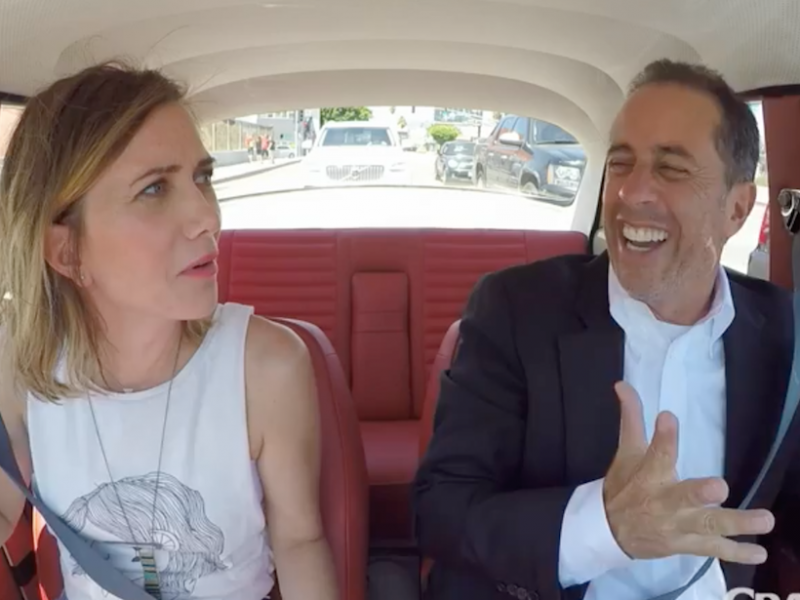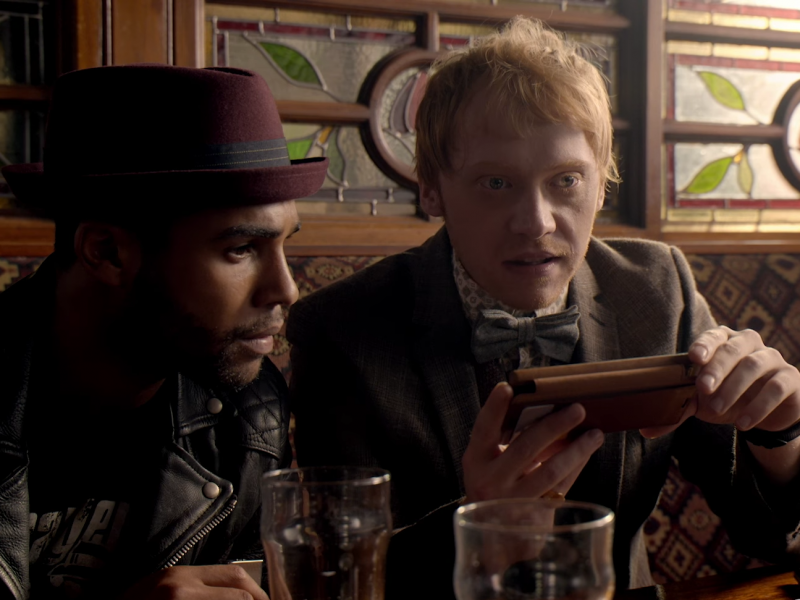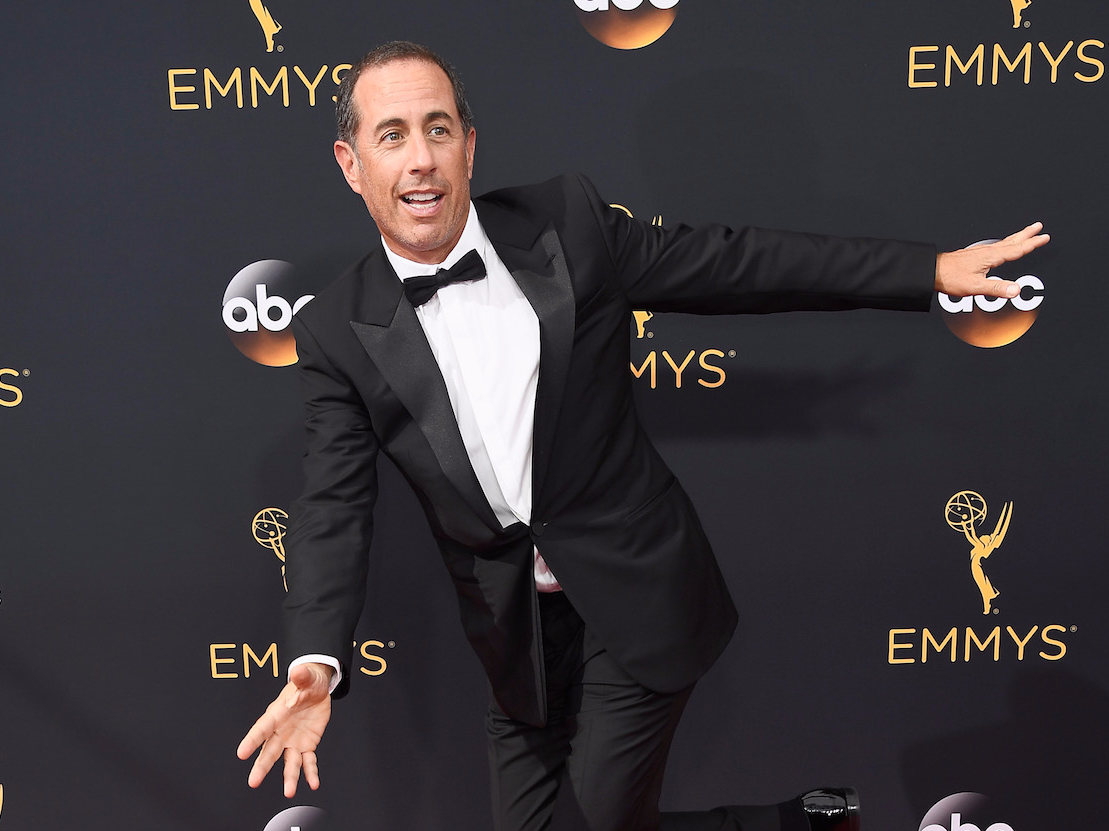When Jerry Seinfeld decided that he wanted to find a new home for his popular web series, “Comedians in Cars Getting Coffee,” he knew exactly what he wanted, and Netflix checked all his boxes.
“When I first started thinking about ‘Comedians in Cars Getting Coffee,’ the entire Netflix business model consisted of mailing out DVDs in envelopes. I love that we are now joining together, both at very different points,” Seinfeld said in a statement on the deal.
Seinfeld’s new deal with Netflix, which grants the streaming service not only the previously produced nine seasons of the show and a new 10th season but also two new stand-up specials – all to be released later this year – reportedly paid Seinfeld $100 million. But the money wasn’t a driving factor for him, individuals with knowledge of the situation told Business Insider under the condition of anonymity.
Having made more than $400 million from the syndication of his hit 1990s sitcom, “Seinfeld,” the actor and comedian doesn’t need to work. He had other pressing reasons for jumping from Crackle, the Sony Pictures Television-owned streaming video service.
Seinfeld’s search for a new home for “Comedians,” which features his joining famous friends for a cup of coffee and a drive while sharing stories, began in earnest in mid-2016 as his contract was due to expire with Crackle. His wanderlust greatly increased in June after Steve Mosko, who had been instrumental on the NBC hit “Seinfeld,” left his position as Sony TV chairman amid reported infighting in the company.
A source told Business Insider that once Mosko left, "Jerry was pretty much out the door."

Seinfeld likes to be in control of all aspects of his projects and becomes personally invested in their success. He calls his celebrity guests to book them for the unconventional interview show himself. So one of Seinfeld's biggest gripes was Crackle's advertising model and the demands placed on him by Acura, the exclusive sponsor of "Comedians."
Acura, for example, could demand that one of its cars be featured on a specific episode set to stream on a date that matched its marketing plan, and Seinfeld didn't like giving up that creative and production control. So while shopping the show, he overwhelmingly targeted companies that had subscription revenue models that didn't depend on advertising. In addition to Netflix and Hulu, Seinfeld approached HBO. The premium cable network considered the offer - or "kicked the tires" as one insider from HBO put it - but things didn't proceed to any "meaningful discussion."
Another major point in the deal with Netflix was the addition of stand-up specials. Crackle knew that was important to Seinfeld and was open to developing comedy specials with him. But that part of the deal also made better sense for Netflix, which was already in the stand-up game and had recently dedicated itself to building up its comedy stable. Seinfeld joins A-list talent like Amy Schumer, Chris Rock, and Dave Chappelle at the streaming giant. That appealed to him.
"I am also very excited to be working with Ted Sarandos at Netflix," Seinfeld said in the deal statement of the chief content officer, "a guy and a place that not only have the same enthusiasm for the art of stand-up comedy as I do, but the most amazing technology platform to deliver it in a way that has never existed before. I am really quite charged up to be moving there."
Seinfeld's final decision to leave Crackle was quickly seen as a blow to the company. "Comedians in Cars" is the service's best-known series and also its most viral. It provided more than 100 million streams for the company as of last year. Critics wondered whether Seinfeld's departure would also affect Crackle's ability to sign big names in the future.
But Seinfeld got a lot out of the partnership, too. At first he just wanted the freedom to create the show he wanted. He didn't even want to market it in its first season, according to an individual from Sony TV. Both were things a burgeoning Crackle could give him.
It also took a lot of "blood and sweat" on Crackle's behalf to get mainstream recognition for the show, according to a source. The show began streaming on Crackle in 2012. Though it received Emmy nominations in 2013 and 2014, they were in special-class categories. It wasn't until last year (and after eight seasons) that the show broke through to a mainstream Emmy nod for variety series after Crackle smartly decided to switch categories.
As Seinfeld's contract was set to expire, Crackle considered the business sense of keeping the show around, asking what "Comedians" brought to it aside from name recognition. The series was also available on Seinfeld's "Comedians" website, for example, so Crackle wasn't benefiting from those views. The other truth, one individual disclosed, is that streams of the show on Crackle had begun to decline in later seasons. Another insider said "Comedians" fans tended to watch just one episode, so Crackle didn't benefit largely from binge-viewing or viewers staying on to watch its other programming.
And what about Crackle's future business objectives? "Comedians" fans steer older than Crackle's younger target demographic (read: gamers) and tended to watch on their desktops over gaming consoles or mobile devices. Also, the short format of "Comedians" was really part of a bygone era for Crackle. In recent years, its focus had turned to more traditional TV lengths for original comedies and dramas.

"I think 'Comedians' is a great program that did break through for us," Crackle general manager Eric Berger told Business Insider when we asked about the show during the recent Television Critics Association press tour, before the show's split from Crackle had been announced. "But it's opened the door for a slate of other great programming that we have right now. So we view it in a portfolio, and a lot more is to come."
Crackle's original slate has grown to include the Emmy-nominated stop-motion comedy "SuperMansion," with Bryan Cranston and Keegan-Michael Key among its voice actors; the tech drama "Startup," starring Martin Freeman and Adam Brody; "The Art of More," a drama set in the world of art trading, with Dennis Quaid and Kate Bosworth; and the coming drama "Snatch," adapted from the heist movie of the same name and featuring "Harry Potter" star Rupert Grint.
"We've got a terrific slate of content, a big group of very big celebrities that are coming to work for us, and we're building show brands, we're building audience, we're building a Crackle brand," Berger said of the company's larger goals beyond being primarily known as the home of Seinfeld and "Comedians."
Still, it's never good to have headlines about a big name departing for a competitor, and we're told Crackle and Sony TV are well aware of that. It remains to be seen what impact, if any, Seinfeld's departure will have on Crackle in the coming year.
A representative for Seinfeld declined to comment for this article, while a Netflix rep didn't immediately respond to Business Insider's request for comment.
Note: A previous version of this article mistakenly stated Seinfeld's income from the "Seinfeld" show. It has been corrected.

